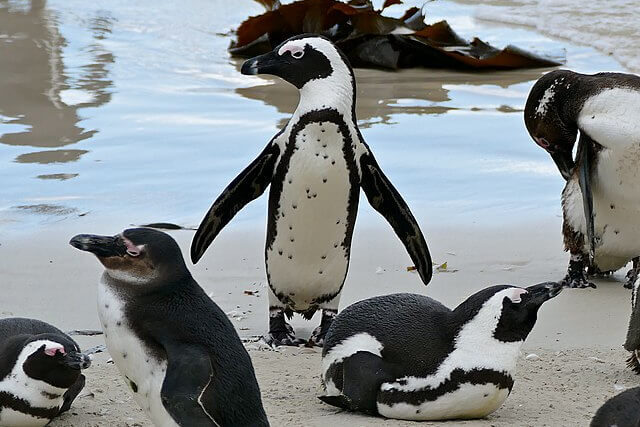
Campaigners have issued a stark warning that African penguins face imminent extinction by 2035 unless urgent measures are implemented to secure their survival.
The decline in African penguin populations has been striking over the past century. In the early 20th century, it is estimated that there were potentially several million breeding pairs. Today, fewer than 11,000 breeding pairs remain, and their numbers continue to plummet.
African penguins are categorized as endangered by the International Union for Conservation of Nature, appearing on its red list of threatened species. If current trends persist, scientists predict that by 2035, there won’t be a sufficient number of breeding pairs for the species to maintain a viable existence in the wild.
Several factors contribute to their precarious situation. Overfishing and environmental shifts in the Indian Ocean have led to severe declines in fish populations like sardines and anchovies, leaving the penguins struggling to find food. Additionally, they face threats from diseases, storms, floods, and pollution.
Renowned for their distinctive markings and distinctive braying calls, African penguins primarily inhabit islands off the coasts of Namibia and South Africa. In 1985, they established a colony at Boulders Beach, located in the Simon’s Town suburb of Cape Town. These charming penguins often venture into the city, making their homes in gardens, seeking refuge beneath cars, and strolling alongside Cape Town commuters.
Despite the threats the penguins face, there is hope for their survival. “Gloom is for naysayers and giving up isn’t an option,” said Dr Judy Mann, executive of strategic projects at the Two Oceans Aquarium Foundation.
“If fisheries, the South African government, oil and shipping companies, scientists, conservationists, international allies and the public work together, we can stop African penguin numbers from declining every year.”
——————————————————————————
At Natural World Fund, we are passionate about stopping the decline in our wildlife.
The decline in our wildlife is shocking and frightening. Without much more support, many of the animals we know and love will continue in their decline towards extinction.
When you help to restore a patch of degraded land through rewilding to forests, meadows, or wetlands, you have a massive impact on the biodiversity at a local level. You give animals a home and food that they otherwise would not have had, and it has a positive snowball effect on the food chain.
We are convinced that this is much better for the UK than growing lots of fast-growing coniferous trees, solely to remove carbon, that don’t actually help our animals to thrive.
This is why we stand for restoring nature in the UK through responsible rewilding. For us, it is the right thing to do. Let’s do what’s right for nature!
Donate today at https://naturalworldfund.com/ and join in the solution!

